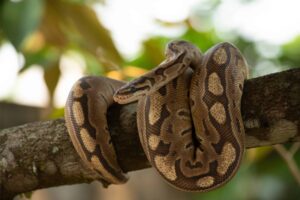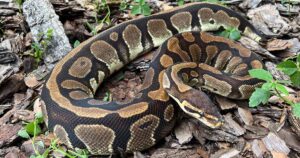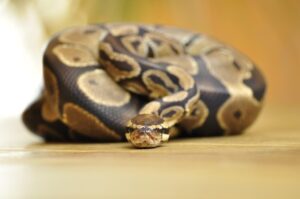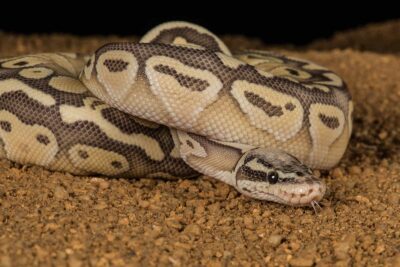Ball pythons, renowned for their docile nature and striking appearance, often spark curiosity among enthusiasts and prospective owners alike. However, a common question that arises is: will ball pythons bite?
Yes, ball pythons have the potential to bite, but they are known for their generally docile temperament compared to many other snake species. Biting is usually a last resort for them when they feel threatened or stressed.
With proper handling and care, the likelihood of a ball python biting is significantly reduced. It’s essential to understand their behavior, provide them with a comfortable environment, and handle them gently and confidently to minimize the risk of a bite.
Understanding Ball Python Behavior

Ball pythons, native to sub-Saharan Africa, are fascinating creatures with unique behaviors. Here are some common behaviors and what they might mean:
- Ball-up: When they feel threatened, ball pythons curl into a tight ball, tucking their head inside. This behavior gives them their name. It’s a defensive mechanism to protect their vulnerable head from predators.
- Hiding: Ball pythons are nocturnal and often hide during the day, seeking out small, dark spaces like burrows or hollow logs. Providing them with multiple hiding spots in their enclosure mimics their natural habitat and helps reduce stress.
- Exploration: Ball pythons are curious by nature and will often explore their environment, especially during the night when they are most active. This behavior is normal and shows that they are healthy and curious about their surroundings.
- Thermoregulation: Ball pythons thermoregulate by moving between warmer and cooler areas of their enclosure. They require a temperature gradient to maintain their body temperature, so providing a thermal gradient in their enclosure is crucial for their health and well-being.
- Feeding response: Ball pythons have a strong feeding response and can be very enthusiastic eaters. However, they may refuse food for various reasons, such as being in shed, feeling stressed, or during breeding season. It’s essential to monitor their feeding habits and adjust their care accordingly.
- Shedding: Like all reptiles, ball pythons shed their skin periodically as they grow. During this time, their eyes may appear cloudy or blue, and they may become more reclusive. Providing a humid hide can help facilitate the shedding process and ensure it is smooth and complete.
- Breeding behavior: During the breeding season, male ball pythons may become more restless and actively search for a mate. Females may exhibit receptive behaviors such as elevating their tail or remaining stationary while being courted by a male. Breeding should only be attempted with healthy, mature individuals and careful consideration of genetics.
Understanding these behaviors can help you provide the best care for your ball python and ensure they thrive in captivity. Additionally, observing your snake regularly will help you identify any changes in behavior that may indicate health issues or stress.
Will Ball Pythons Bite?
Ball pythons are generally docile and reluctant to bite unless they feel threatened or stressed. They are more likely to use defensive behaviors such as curling into a ball or trying to escape rather than biting. However, like any animal, they may bite if they feel cornered, provoked, or mishandled.
Here are some situations where a ball python might be more likely to bite:
- Feeding time: Ball pythons have a strong feeding response, and they may accidentally bite if they mistake your hand for food. Always use feeding tongs to offer food to your snake to avoid this.
- Handling stress: Handling a ball python improperly or excessively can cause stress, which may lead to defensive behaviors such as biting. Always handle your snake gently and support its body to help it feel secure.
- Sudden movements or loud noises: Ball pythons are sensitive to sudden movements and loud noises, which can startle them and trigger a defensive response. Approach your snake calmly and avoid making sudden movements or loud noises around them.
- Health issues: If a ball python is sick or in pain, it may become more defensive and prone to biting as a means of self-protection. Regular health check-ups and prompt veterinary care can help prevent this.
Overall, with proper handling and care, the likelihood of a ball python biting is relatively low. However, it’s essential to always respect your snake’s boundaries and handle them gently to maintain trust and minimize stress for both you and your pet.
If you’re unsure how to handle your snake safely, consider seeking guidance from a reptile expert or experienced keeper.
Identifying Ball Pythons Signs of Stress and Aggression
Identifying signs of stress and aggression in ball pythons is crucial for providing proper care and handling. Here are some indicators to watch for:
- Hissing or Lunging: Ball pythons may hiss or lunge when they feel threatened or stressed. This is a defensive behavior intended to warn potential predators to stay away.
- Defensive Postures: When stressed or feeling threatened, ball pythons may assume defensive postures such as flattening their bodies, raising their heads, or coiling tightly into a ball.
- Striking: While ball pythons are generally docile, they may strike if they feel cornered or frightened. A stressed or aggressive snake may strike defensively to protect itself.
- Tail Vibrations: Some ball pythons may vibrate their tails when stressed or agitated. This behavior is typically a warning sign that they are feeling threatened and may strike if further provoked.
- Retreating or Hiding: If a ball python feels stressed or threatened, it may retreat to its hiding spot or attempt to escape from the perceived threat. Hiding behavior can also indicate that the snake is feeling insecure or anxious.
- Loss of Appetite: Stress can cause a ball python to lose its appetite. If your snake suddenly stops eating and all other environmental factors are normal, it could be a sign of stress.
- Excessive Shedding: Stress can also impact a snake’s shedding cycle. If your ball python is experiencing frequent or incomplete sheds, it may be a sign of stress or an underlying health issue.
- Unusual Aggression: While ball pythons are typically docile, some individuals may exhibit more aggressive behavior due to factors such as genetics, past experiences, or improper handling. Persistent aggression that cannot be attributed to stressors in the environment may require professional intervention.
It’s essential to remember that ball pythons are generally shy and non-aggressive animals. Most instances of stress or aggression can be attributed to environmental factors, improper handling, or health issues.
Providing a secure and enriched environment, handling your snake gently and respectfully, and monitoring their behavior closely will help ensure their well-being and minimize stress. If you notice any signs of stress or aggression in your ball python, it’s best to address the underlying cause promptly and seek advice from a reptile veterinarian or experienced snake keeper if needed.
Factors Leading to Ball Pythons Biting Behavior

Several factors can contribute to ball pythons exhibiting biting behavior. Understanding these factors can help prevent bites and ensure the well-being of both the snake and its keeper:
- Feeding Response: Ball pythons have a strong feeding response and may mistake hands or fingers for food, especially if they are hungry or if the keeper’s scent is on the prey item. Always use feeding tongs to offer food to your snake to avoid accidental bites.
- Handling Stress: Improper handling techniques or excessive handling can stress ball pythons, leading to defensive behaviors such as biting. Always handle your snake gently and support its body to help it feel secure. Avoid sudden movements or loud noises that may startle the snake.
- Territorial Behavior: Ball pythons may exhibit territorial behavior, particularly during breeding season. Male ball pythons may become more aggressive in defending their territory or courting a female. It’s essential to be cautious when handling snakes during this time and to respect their space.
- Health Issues: Sick or injured ball pythons may exhibit defensive behaviors, including biting, as a means of protecting themselves from further harm. Regular health check-ups and prompt veterinary care can help prevent or address health issues that may contribute to biting behavior.
- Stress from Enclosure Conditions: Poor enclosure conditions, such as inadequate temperature, humidity, or hiding spots, can stress ball pythons and lead to defensive behaviors, including biting. Ensure that your snake’s enclosure meets its environmental needs and provides a secure and enriched environment.
- Fear or Anxiety: Ball pythons may bite if they feel threatened or anxious, particularly in unfamiliar or stressful situations. Avoid sudden movements, loud noises, or handling when your snake is displaying signs of fear or anxiety.
- Previous Trauma or Mishandling: Ball pythons that have experienced trauma or mishandling in the past may be more prone to defensive behaviors, including biting. It’s essential to build trust gradually with your snake through gentle handling and positive interactions.
- Genetic Factors: Some individual ball pythons may have a predisposition to exhibit more defensive behaviors, including biting, due to genetics or past experiences. While genetic predisposition cannot be changed, proper handling and care can help mitigate aggressive tendencies.
By addressing these factors and providing appropriate care and handling, you can help prevent biting behavior in ball pythons and promote a positive relationship between you and your pet snake. If you’re unsure how to handle your snake safely or if your snake exhibits persistent biting behavior, consider seeking guidance from a reptile expert or experienced snake keeper.
Minimizing the Risk of Ball Pythons Bites
Minimizing the risk of ball python bites involves understanding their behavior, providing proper care, and practicing safe handling techniques. Here are some tips to help reduce the likelihood of bites:
- Regular Handling: Handle your ball python regularly to help it become accustomed to human interaction. Start with short handling sessions and gradually increase the duration as your snake becomes more comfortable.
- Supportive Handling: Always support your snake’s body when handling to help it feel secure and reduce stress. Avoid sudden movements or loud noises that may startle the snake.
- Watch for Signs of Stress: Learn to recognize signs of stress in your ball python, such as hissing, defensive postures, or retreating. If your snake shows signs of stress, gently return it to its enclosure and give it time to calm down before attempting to handle again.
- Feed Responsibly: Use feeding tongs to offer food to your ball python to avoid accidental bites. Never handle your snake immediately after it has eaten, as this can increase the risk of regurgitation and stress.
- Respect Their Space: Avoid handling your ball python during times when it may be more defensive, such as during shedding or breeding season. Respect your snake’s space and avoid disturbing it when it is resting or hiding.
- Maintain Proper Enclosure Conditions: Ensure that your ball python’s enclosure meets its environmental needs, including temperature, humidity, and hiding spots. A comfortable and enriched environment will help reduce stress and minimize the risk of defensive behaviors.
- Handle with Care: Be gentle and deliberate when handling your ball python. Avoid grabbing or restraining it forcefully, as this can cause stress and increase the likelihood of biting.
- Educate Yourself: Learn about ball python behavior and body language to better understand your snake’s needs and preferences. This knowledge will help you anticipate and avoid situations that may lead to biting.
- Supervise Interactions: Always supervise interactions between your ball python and other pets or people, especially children. Teach children how to handle the snake gently and respectfully to minimize the risk of bites.
- Seek Professional Help if Needed: If your ball python exhibits persistent aggressive behavior or if you are unsure how to handle it safely, seek guidance from a reptile veterinarian or experienced snake keeper.
By following these tips and being mindful of your ball python’s behavior and needs, you can help minimize the risk of bites and foster a positive relationship with your pet snake.

What to Do If Bitten by Ball Python
If you are bitten by a ball python, it’s essential to stay calm and take appropriate steps to minimize the risk of injury and infection. Here’s what to do if you are bitten by a ball python:
- Stay Calm: While being bitten can be alarming, try to remain calm. Ball python bites are typically not dangerous, and panicking can escalate the situation.
- Gently Remove the Snake: If the snake has not released its bite, gently and carefully try to remove it from your skin. Avoid pulling or yanking the snake, as this can cause further injury.
- Do Not Agitate the Snake: Avoid making sudden movements or trying to pry the snake’s mouth open. This can cause the snake to bite down harder or become more agitated.
- Control Bleeding: If the bite has broken the skin and is bleeding, apply gentle pressure with a clean cloth or bandage to control the bleeding. Elevate the affected area if possible.
- Clean the Wound: Wash the bite wound with mild soap and water to reduce the risk of infection. If the wound is deep or if you are concerned about infection, seek medical attention.
- Monitor for Signs of Infection: Keep an eye on the bite wound for any signs of infection, such as increased pain, swelling, redness, warmth, or discharge. If you notice any of these symptoms, seek medical attention promptly.
- Seek Medical Attention if Necessary: While ball python bites are generally not harmful, they can cause puncture wounds that may become infected. If you are unsure about the severity of the bite or if you develop symptoms of infection, seek medical attention from a healthcare professional.
- Evaluate the Circumstances: Reflect on the circumstances surrounding the bite to identify any potential triggers or contributing factors. This can help you prevent future bites by adjusting your handling techniques or addressing any environmental stressors.
Remember that ball python bites are usually not serious, but it’s essential to take appropriate steps to care for the wound and prevent infection. If you have concerns or questions about a ball python bite, don’t hesitate to consult with a medical professional for guidance.
Conclusion
On this page you will get to find the resource that answers the question Will Ball Pythons Bite. While ball pythons are generally docile creatures, there is always a potential for bites under certain circumstances. Understanding their behavior, providing appropriate care, and handling them gently can significantly reduce the risk of bites.
It’s essential for snake keepers to be knowledgeable and attentive, ensuring a safe and harmonious relationship with their ball pythons. Will Ball Pythons Bite? Yes, but with proper care and respect, incidents can be minimized, allowing for enjoyable interactions with these fascinating reptiles.

